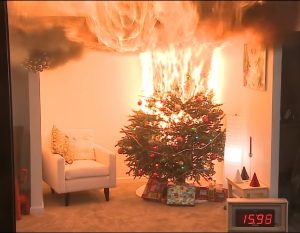On this page you can find some Fire Safety and Prevention tips for the month of December. As December is usually a rather busy month with holidays, changes in weather, etc. there’s quite a few ideas to help you be proactive in Fire Safety this month. Remember, Santa might love doing house calls in December for all the good reasons… But we don’t want to have to for the bad ones!
Holiday Entertaining
- Keep any entry/exits in your home cleared from snow. This can ensure you can get out in case of a fire. Make sure all windows are not frozen in case you need to use these as an escape mechanism or to be able to call for help to the outside.
- Test your smoke and carbon monoxide alarms before gatherings.
- Make sure your guests know about all of the exits from your home in case of emergency. Also plan an easily reachable meeting location so you can quickly ensure everyone has made it out.
- Keep candles up and away from children and pets. Ensure children and pets are not left unsupervised near any open flames including candles and fireplaces. Also ensure any ignition devices (lighters, matches) are kept up high or in a locked cabinet.
- Stay in the kitchen when cooking. Don’t leave a working stove or oven unattended.
- Don’t drink & drive or let your guests drink & drive. Make sure you plan ahead and have a designated driver, arrange for a cab or other alternative transportation.
Cooking
Unattended cooking is the number one cause of home fires in Ontario, so be extra careful when cooking.
- Be attentive. If you are drowsy or have consumed alcohol don’t use the stove, oven, barbeque or any other cooking appliance.
- Do not leave an in-use stove unattended. If you must leave the room, even momentarily, turn off the stove. Stay in the kitchen while you are cooking food.
- Ensure you are checking your cooking food regularly. Use a timer to remind yourself to check.
- Keep any flammable objects such as wooden utensils, food packaging, or towels off of and away from your stovetop.
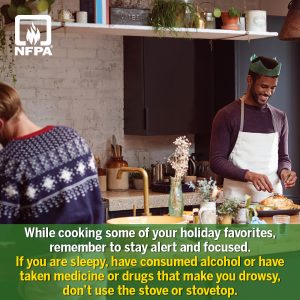
- NEVER throw water on a grease fire. This causes an explosive reaction as water instantly turns to steam, expands out of the pot violently, and carries flaming grease up in the air with it.
- Smother the flames by covering the pot ot pan with a lid.
- Turn off the heat immediatly. Do not remove the lid until the pan is completely cooled.
- You can use baking soda on small/shallow grease fires. Do not use flour as it can be explosively flammable with the right flour to air mixture.
- Never turn on the overhead fan, as this could spread the fire quickly into the duct work and into the walls/ceiling spaces of your home.
Christmas Trees
Artificial Trees: Even artificial trees can catch fire! Whether bringing up an old one from storage or purchasing a new one, check to see if your artificial tree has a tag or label which says “Fire Resistant.” While this does not mean the tree won’t catch fire at all, it should mean the tree will resist burning and should extinguish quickly.
Decorations
- Do not decorate your Christmas tree with real lit candles. Artificial LED candles look great without the fire risk.
- If decoration with artificial snow sprays, ensure you follow the manufacturer directions on the label carefully. Also ensure the product has fully dried before plugging in and turning on the tree lights. Aerosol snow sprays are highly flammable when spraying and drying.
- While glass tree decorations look great, if broken they could lead to cuts or glass slivers. Consider plastic alternatives as they usually just bounce. Keep any glass decorations up and out of reach of children.
Holiday Lightings
- Make sure you inspect each set of lights before use, even new ones, to ensure there is no damage to the sockets, bulbs or wires. Dispose of any damaged sets immediately and properly following local guidelines.
- Always use CSA and/or UL approved lights, extension cords and power bars/surge protectors.
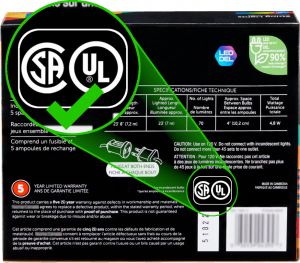
- Ensure you do not overload any extension cords, power bars or outlet adapters. Refer to the manufacturer’s instructions for the maximum number of light stands that can be used per extension cord and outlet.
- Make sure to turn off all lights before leaving the house, when you go to bed or when you will not be in the room for an extended period of time.
- Use plastic clips to fasten outdoor lights securely.
- Plug outdoor lights and decorations into ground fault circuit interrupters (GFCIs) or outlets protected by a GFCI.
Fireplaces
- Have any chimneys cleaned and inspected prior to using fireplaces for the first time in a season, and periodically throughout.
- When cleaning a wood fireplace, place all embers and ash in a metal container with a lid and take them outside to store or dispose of. Do not place them in any type of container that is not fire-resistant, such as a plastic or paper bag. Do not dispose of them indoors, close to your home or close to any other structure such as a garage or shed.
- Clean the ashes out regularly to sure the fire box does not become overloaded.
- Do not dispose of any wrapping papers or gift boxes in a fireplace. Wrapping paper and cardboard gift boxes can ignite quickly and burn intensely which could lead to severe burns or an out of control fire in your home.
- Do not hang any Christmas stockings or decorations from the mantel if/when the fireplace is in use.
- Always use an ember screen in front of any open fireplaces to protect against flying sparks.
- Never use any flammable liquids or aerosols such as gasoline or brake cleaner to start a fire.
- Use only thoroughly dried wood. Do not use your Christmas tree for firewood.
- Never leave the fire unattended or let it smolder.
- Clean the ashes regularly. Place the ashes in a metal container and store outside away from flammable materials.
Candles
- Never leave candles unattended. Ensure you extinguish any lit candles when leaving the room or going to sleep.
- Place candles in burn-resistant containers that won’t tip over. These containers should be big enough to collect any wax drippings. Keep lit candles away from items that can catch fire
- Don’t place lit candles near windows with blinds or curtains.
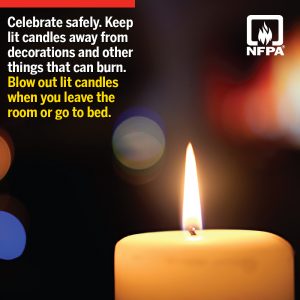
- Keep candles up and away from children and pets. Never leave children or pets unsupervised near lit candles. Avoid placing candles in high traffic areas where they could easily be knocked over.
- Never let candles burn completely to the bottom. Extinguish and dispose of them when they get within 4 cm of the base. This includes standard candle sticks as well as jar candles
- Do not allow children of any age to light candles in their bedrooms.
- Be careful when using candles for light during power outages, exercise caution when using candles as a light source. Instead, try using LED lights or flashlights to avoid potential fire risks
- Never use lit candles for light when refueling equipment such as a generator, camp fuel heater or lantern.
- Keep candle wicks short when not in use, trim if necessary to approx. 1/4 inch.
- Use extreme caution when carrying a lit candle, holding it well away from you, your clothes and any other combustible objects near you.
Heating
- Keep a clear space of at least 3 feet (1 meter) around any heating equipment, like a furnace, fireplace, wood stove, or portable space heater. Use the same rule to keep children at distance from heat sources as well.
- Never use an oven or barbeque to heat your home. Not only does this present a huge fire risk, but the carbon monoxide emissions from a left open oven or barbeque build up quickly and are deadly.
- Have heating equipment, chimneys and furnace/boiler vents cleaned and inspected every year by a qualified professional.
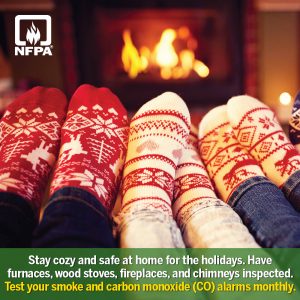
- Never leave portable heaters running unattended. Turn them off when leaving the room or going to bed.
- Follow manufacturer instructions for correct operations of any space heaters. Only use fuel specified by manufacturers for any fuel burning space heaters.
- Be sure all furnace controls and emergency fuel and electrical breaker shutoffs are in proper working condition.
- Inspect the walls and ceiling near the furnace and along the chimney line. If the wall is hot or discoloured, additional pipe insulation or clearance may be required.
- Check your chimney flue pipe and pipe seams. Ensure they are well supported, free of holes, cracks and any damage. If any damage is noticed, have those sections replace immediately. Do not use any fireplaces with damaged chimneys, brick or metal. Soot around pipe seams may be an indicator of a leak.
- All unused flue openings should be sealed properly.
